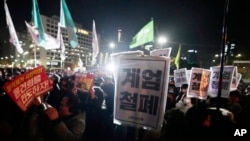The United States expressed relief and welcomed South Korean President Yoon Suk Yeol's decision to rescind the order declaring emergency martial law in accordance with the country's constitution. Yoon's decision followed a unanimous vote by the National Assembly to reject the declaration.
"We continue to expect political disagreements to be resolved peacefully and in accordance with the rule of law," U.S. Secretary of State Antony Blinken said in a statement late Tuesday. "We reaffirm our support for the people of Korea and the U.S.-ROK alliance based on shared principles of democracy and the rule of law."
South Korea is known officially as the Republic of Korea, or ROK.
The U.S. had been closely monitoring the rapidly unfolding situation in South Korea "with grave concern" after Yoon declared emergency martial law late Tuesday, citing the need to protect the nation from North Korea's communist forces and eliminate anti-state elements.
Just hours later, Yoon announced he would lift the martial law decree after South Korean lawmakers voted to reject his decision and protesters gathered outside parliament.
Taken by surprise, U.S. officials are actively engaging with their South Korean counterparts in Washington and Seoul, gathering facts and assessing the situation on the ground.
"We were not notified of President Yoon's announcement in advance," State Department deputy spokesperson Vedant Patel told reporters during a briefing on Tuesday.
"I have no threat assessment analysis to offer as it relates to the DPRK in the context of this," Patel told VOA when asked if the U.S. had received specific threats in the past 24 hours from North Korea, officially known as the Democratic People's Republic of Korea.
Meanwhile, the U.S. Embassy in Seoul announced the cancellation of routine consular appointments for American citizens and visa applicants on Wednesday.
The embassy also urged U.S. citizens in South Korea to monitor local news, follow official guidance, avoid demonstration areas, and exercise caution near large gatherings or protests, as even peaceful demonstrations can escalate unexpectedly.
U.S. Deputy Secretary of State Kurt Campbell said earlier on Tuesday that the U.S. was watching developments in South Korea "with grave concern" and expressed every hope and expectation that "any political disputes will be resolved peacefully and in accordance with the rule of law."
President Joe Biden, White House national security adviser Jake Sullivan and Blinken have been briefed on the developments and are being kept updated as the situation unfolds, according to Campbell.
Biden was briefed on the latest developments in South Korea as his motorcade was en route to his hotel in Luanda, the capital of Angola. Biden is on his first trip to Africa as president.
At the Pentagon, spokesperson Major General Patrick Ryder told reporters during a news briefing that he did not believe the martial law declaration would significantly affect the approximately 28,500 U.S. troops stationed in South Korea.
Ryder added that the militaries of the two allies are "in contact," but that there has been no request for assistance from Seoul.
Some U.S. lawmakers have expressed concerns about the fluid developments in South Korea.
Senator Chris Murphy, a Democrat from Connecticut and a member of the Senate Foreign Relations Committee, said it was "very frightening to see a key democratic ally in crisis."
Murphy told VOA Mandarin that he was relieved by Yoon's decision to lift martial law but that the initial declaration was "a real stunning turn of developments — stunning and dangerous."
Senator Jeanne Shaheen, a Democrat from New Hampshire and a member of the Senate Foreign Relations Committee, shared those concerns, describing the situation as "a troubling development."
Late Tuesday, Yoon declared martial law during an unannounced late-night address, vowing to eliminate what he described as "anti-state" forces amid a power struggle with the opposition-controlled parliament, which he accuses of sympathizing with communist North Korea.
Within hours, the National Assembly voted to overturn the declaration. Speaker Woo Won Shik announced that lawmakers "will protect democracy with the people" and called for the immediate withdrawal of police and military forces from the Assembly grounds.
Yihua Lee from VOA Mandarin contributed to this report. Some information for this report came from Reuters and The Associated Press.





